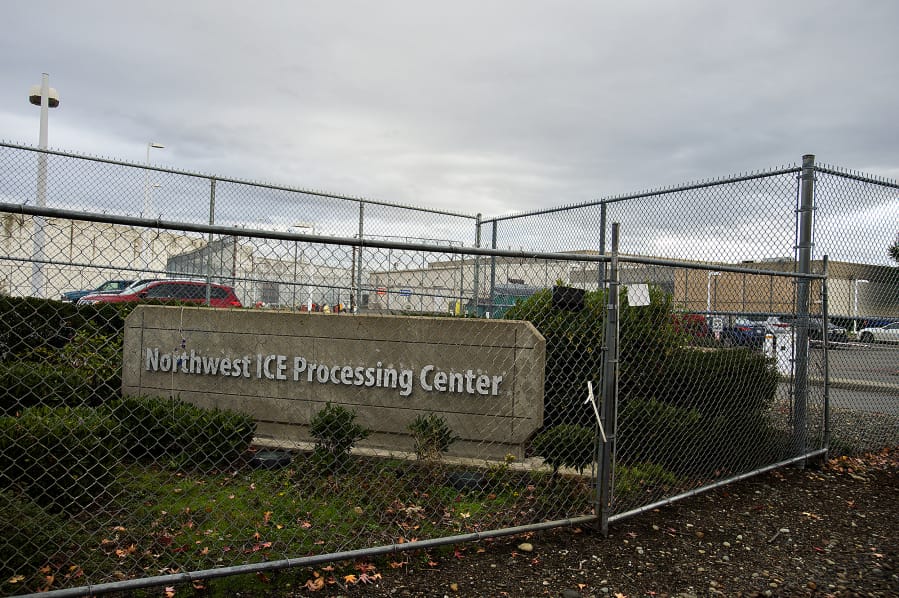SEATTLE — A 2021 law passed by Washington state Democrats that aimed to shut down one of the nation’s largest for-profit privately run immigration jails has been rendered toothless.
The Northwest Detention Center in Tacoma, which holds people the federal government is seeking to deport, will not be forced to shut down in 2025, despite the law, which explicitly sought to close the facility.
The private prison will, instead, likely remain open for the foreseeable future unless the federal government decides to close it.
The about-face comes after the 9th Circuit Court of Appeals ruled last year that a similar California law, which sought to ban private prisons in the state, violates the supremacy clause of the Constitution, which prohibits states from interfering with federal government powers.
“California cannot exert this level of control over the federal government’s detention operations,” the majority wrote in that decision.
Just last week, after months of consideration, Washington conceded that it was also bound by the 9th Circuit decision.
Washington Gov. Jay Inslee and Attorney General Bob Ferguson submitted a brief court filing last week saying that as long as the 9th Circuit decision stands, and as long as the Northwest Detention Center is operated under a contract with federal Immigration and Customs Enforcement, “they will not enforce” the state law that seeks to shut down the prison.
The law passed in 2021 banned private, for-profit prisons. There is only one of those in Washington, the 1,575-bed Northwest ICE Processing Center, also known as the Northwest Detention Center, in Tacoma. It is operated by the GEO Group, a Florida-based company with $2.4 billion in annual revenue, which manages more than 90 detention and re-entry facilities.
The law’s supporters argued that privately run prisons have lower standards than those run by the government and can end up incarcerating people for profit rather than for reasons of safety or justice.
The law would have allowed the Tacoma prison to continue operating until GEO Group’s contract with ICE expired in 2025.
It attracted some Republican support in the state House, but Senate Republicans were united in their opposition, with some questioning whether the state had the authority to enact the law.
“Washington has not supported use of private prisons, and this bill continues that policy,” Inslee said when he signed the bill in 2021.
Ferguson, when the law passed, said his office had reviewed it carefully, supported it and was prepared to defend it in court.
Jaime Smith, an Inslee spokesperson, said the 9th Circuit’s decision essentially meant Washington couldn’t enforce the law. She referred other questions to Ferguson’s office.
Brionna Aho, a Ferguson spokesperson, said the California decision only became final in May and declined further comment.
California passed a similar law in 2019. GEO Group sued California the same year in, as did the Trump administration. The Biden administration later adopted the same arguments.
GEO Group sued Washington in 2021, again arguing that the state law interfered with its contract and was a “direct assault on the supremacy of federal law.”
Supporters of the 2021 Washington law said a result like this was inevitable after the 9th Circuit’s decision.
“It essentially gutted the decision of the state to enforce that new law,” said Matt Adams, legal director for the Northwest Immigrant Rights Project, which pushed for the 2021 law and filed an amicus brief to support it in court.
The bill’s lead sponsor, Rep. Lillian Ortiz-Self, D-Mukilteo, saw the writing on the wall earlier this year and sponsored legislation to — if she couldn’t close the prison — at least give the state more oversight of it.
Her bill, which passed in April, largely along party lines, requires the state to adopt hygiene and safety rules for private prisons and to inspect the prison. It also sets rules meant to comply with state prison rules for things such as the price of food in the commissary, prohibitions on solitary confinement and access to telephones and a library.
“Morally, you’re making a profit off of people that are the most vulnerable and have no voice,” Ortiz-Self said. “The GEO corporation knows that in the state of Washington we are looking at them, we are pushing back.”
GEO Group did not respond to a request for comment Wednesday.
Ferguson sued GEO Group in 2017, alleging it violated Washington’s minimum wage law by paying detainees as little as $1 per day. A jury ruled for the state in 2021, and GEO Group was ordered to pay more than $23 million in back pay, although appeals are ongoing.
The Northwest Detention Center has housed an average of 558 people a day over the past year or so, according to an ICE database, the 15th most of any ICE facility in the country. But the agency’s contract with GEO Group ensures it is paid for a minimum of 1,181 people a day, regardless of how many people are actually incarcerated.
The Government Accountability Office, in a 2021 report, chided ICE for its use of “guaranteed minimums.”
“ICE has increasingly incorporated guaranteed minimum payments into its contracts and agreements,” the GAO wrote. “However, ICE has not taken a strategic approach to these decisions and has spent millions of dollars a month on unused detention space.”
Adams, of the Northwest Immigrant Rights Project, said that was emblematic.
“One of the key problems with this immigration system we have is it creates this profit motive for locking people up,” he said. “You have people being locked up in order to correspond to contracts, in order for private companies to increase their revenue instead of only locking up a person because they represent a threat to the community or a flight risk.”



